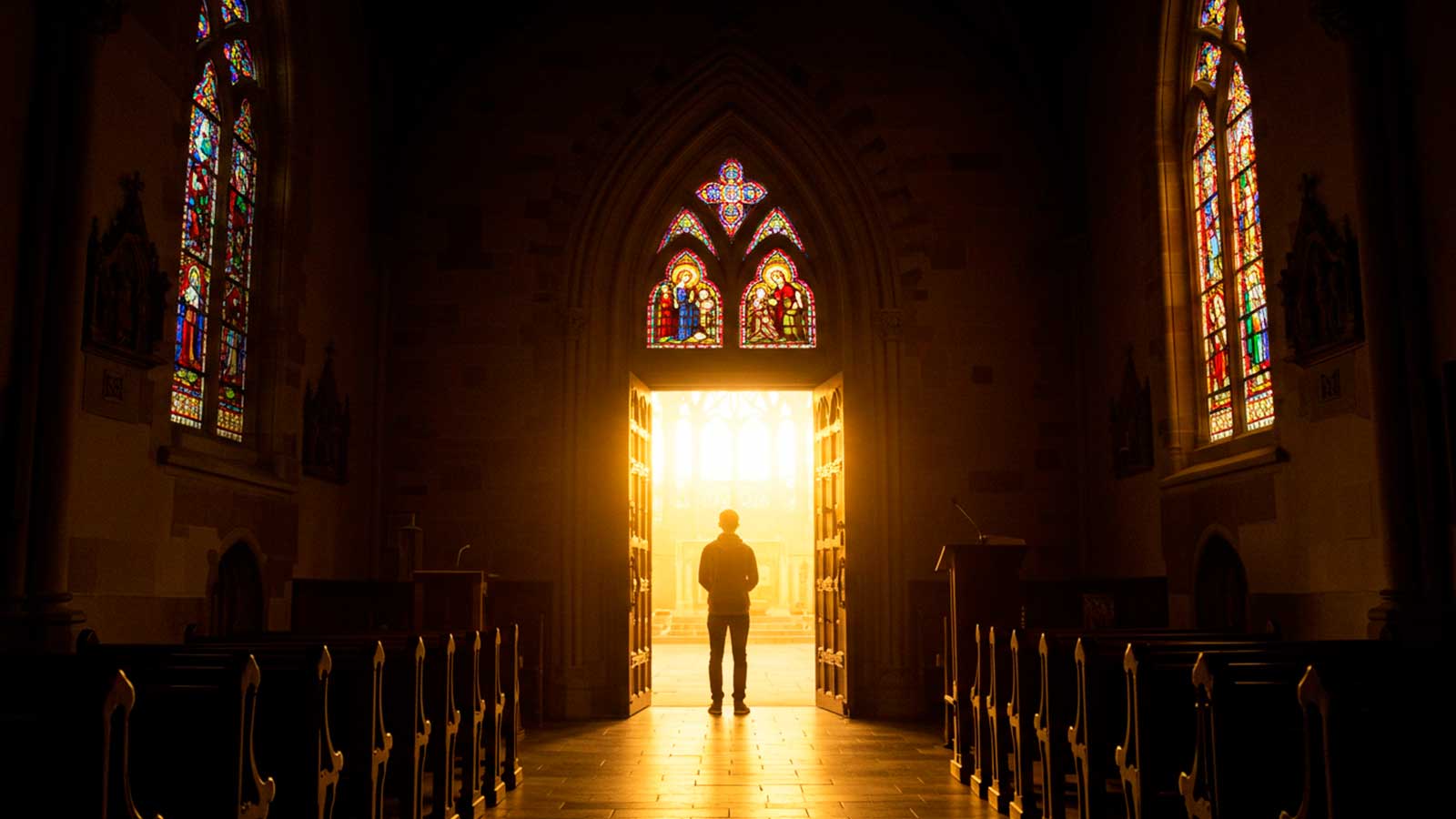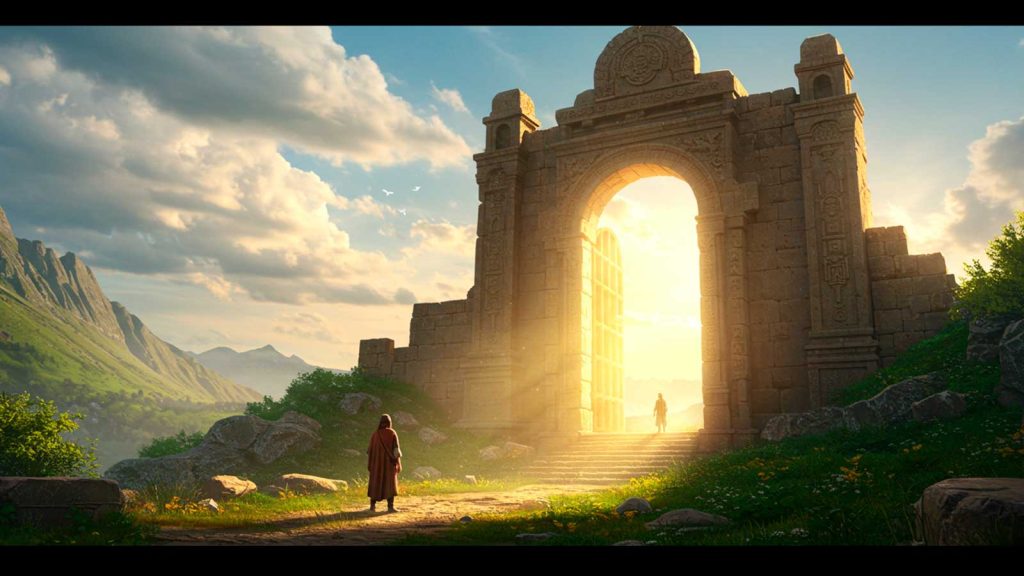Psalm 24
The Psalm 24 is one of the most profound passages in the Book of Psalms. It highlights the majesty of God, the purity required to approach Him, and the triumph of the King of Glory. In this article, we will explore the historical context, spiritual symbolism, and interpretations surrounding this inspiring psalm. Throughout this content, you will understand the importance of Psalm 24 in the faith and how it can be applied to everyday life.
Complete Psalm 24
¹ The earth is the Lord’s and the fullness thereof, the world and those who dwell therein.
² For He has founded it upon the seas, and established it upon the rivers.
³ Who may ascend the hill of the Lord? or who may stand in His holy place?
⁴ He who has clean hands and a pure heart, who does not set his soul to vanity, nor swear deceitfully.
⁵ He shall receive the blessing from the Lord, and righteousness from the God of his salvation.
⁶ This is the generation of those who seek Him, who seek Your face, O God of Jacob. (Selah.)
⁷ Lift up your heads, O gates; and be lifted up, O ancient doors, that the King of Glory may come in.
⁸ Who is this King of Glory? The Lord strong and mighty, the Lord mighty in battle.
⁹ Lift up your heads, O gates; lift them up, O ancient doors, that the King of Glory may come in.
¹⁰ Who is this King of Glory? The Lord of hosts, He is the King of Glory. (Selah.)

Psalm 24 Explained Verse by Verse
Verse 1
The earth is the Lord’s and the fullness thereof, the world and those who dwell therein.
This verse declares the absolute sovereignty of God over all creation. Everything belongs to Him — the earth, nature, resources, and all living beings. Nothing exists independently of the Creator. It is an assertion of divine dominion and authority.
Verse 2
For He has founded it upon the seas, and established it upon the rivers.
Here, David reinforces the idea that God is the Creator of the earth, even establishing it upon unstable elements such as the seas. It is a powerful image of divine control over chaos. The stability of the world comes from God’s power, not from natural forces.
Verse 3
Who may ascend the hill of the Lord? or who may stand in His holy place?
The focus now shifts from God as Creator to God as Holy. The question reveals the reverence required to approach the Lord. The “hill of the Lord” represents the meeting place with God—a spiritual space for worship and intimacy.
Verse 4
He who has clean hands and a pure heart, who does not set his soul to vanity, nor swear deceitfully.
Here is the answer to the previous question. To be in the presence of God, one must have righteous actions (clean hands), proper intentions (a pure heart), and a life free from falsehood (no vanity or deceitful oaths). Holiness is essential for communion with the Lord.
Verse 5
He shall receive the blessing from the Lord, and righteousness from the God of his salvation.
The consequence of integrity is clear: those who strive to live in truth and holiness will be blessed by God. Here, “righteousness” represents divine favor—the righteousness granted by God to those who sincerely seek Him.
Verse 6
This is the generation of those who seek Him, who seek Your face, O God of Jacob. (Selah.)
The psalmist recognizes that there is a group—a generation—that is devoted to seeking God with intensity. “Seeking the face of God” means desiring intimacy, deep communion, and divine guidance. The term “Selah” suggests a reflective pause to meditate on this sincere search.
Verse 7
Lift up your heads, O gates; and be lifted up, O ancient doors, that the King of Glory may come in.
The language here is both poetic and majestic. The “gates” symbolize barriers or limits that must open before the arrival of the King of Glory. It is a triumphant scene, a call to receive God with reverence and honor.
Verse 8
Who is this King of Glory? The Lord strong and mighty, the Lord mighty in battle.
This rhetorical question is followed by a powerful answer: the King of Glory is the Lord, depicted as a victorious warrior. This image reveals God’s strength to defeat evil, protect His people, and establish His sovereignty.
Verse 9
Lift up your heads, O gates; lift them up, O ancient doors, that the King of Glory may come in.
This verse repeats the call for exaltation, emphasizing the significance of the Lord’s arrival. The repetition underscores the solemnity of the moment, as if heaven and earth are being called to prepare for the entrance of the Most High.
Verse 10
Who is this King of Glory? The Lord of hosts, He is the King of Glory. (Selah.)
The final answer identifies God as the “Lord of hosts” — a military title that emphasizes His absolute power over all realms and forces. He is the true King of Glory, worthy of all adoration. The final “Selah” calls for a silent contemplation of this majesty.

The Origin of Psalm 24
Psalm 24 is attributed to King David and was likely written on a very special occasion: the entry of the Ark of the Covenant into Jerusalem. This event represented more than a religious celebration; it was a symbol of God’s presence dwelling among His people.
This psalm is divided into three distinct parts, which together construct a spiritual journey—from the divine creation, through the holiness required of those who desire to be with God, to the glorification of the King of Glory.
Structure of Psalm 24
Psalm 24 contains 10 verses and can be divided into three main sections:
The Sovereignty of the Lord Over All the Earth (verses 1 and 2)
These verses introduce the theme of creation. The psalmist asserts that the entire earth belongs to the Lord, as He founded it upon the seas and established it upon the waters.
Who May Ascend the Hill of the Lord? (verses 3 to 6)
This is the heart of the psalm. The question is asked: who can stand in the presence of God? The answer points to the need for clean hands, a pure heart, an integrity of soul, and sincerity.
The Entrance of the King of Glory (verses 7 to 10)
In this final part, the tone becomes triumphant. It is a call for the gates to open, for the King of Glory desires to enter. A powerful portrayal of God’s power and authority.
The Spiritual Meaning of Psalm 24
Psalm 24 conveys several spiritual messages. First, it affirms that everything belongs to God — creation, people, and history. Second, it teaches that God accepts no kind of worship without integrity, purity, and reverence. Finally, it reveals that God is victorious, mighty, and worthy of celebration.
Holiness as a Condition for Access
Psalm 24 is clear: those who desire to be with God must live righteously. This includes external actions (clean hands) and internal motivations (a pure heart). The text reveals a high standard that leads to eternal blessings.
The Glory of the Victorious King
The end of Psalm 24 describes God as a strong and mighty King in battle. This symbolism reinforces that God is sovereign over all circumstances. He not only governs with authority, but also triumphs over every opposition.
Applications of Psalm 24 in Daily Life
Meditating on Psalm 24 can transform the way we face life. It challenges us to be people of integrity, invites us to seek the presence of God, and to recognize His authority in every area. Here’s how to apply these teachings:
Seek a Pure Heart
It is not enough to perform good actions if the heart is contaminated with pride, deceit, or selfish interests. Psalm 24 teaches us to look within and pursue a sincere faith.
Live with Reverence
Living with reverence means understanding that God sees all and deserves to be honored in every decision. This produces awe and responsibility in each act.
Recognize Divine Sovereignty
Even when plans fail or adverse winds blow, Psalm 24 reminds us: everything belongs to the Lord. He is in control and enters with glory wherever we invite Him.

Symbolism in Psalm 24
Psalm 24 is rich in poetic and symbolic imagery:
The Hill of the Lord
The hill represents the meeting place with God, a lofty space that requires spiritual effort and ethical commitment to be reached.
Clean Hands and a Pure Heart
These expressions indicate a life of integrity—both in behavior and intentions. Communion with God requires truth on every level of being.
Ancient Doors
The “doors” in the psalm are a metaphor for the heart, for nations, and even for heaven itself. When it says “lift up your heads, O gates,” it is an invitation to allow God to enter with His glory.
Comparisons with Other Psalms
Some scholars point out that Psalm 24 complements Psalms 22 and 23, forming a faith triptych:
- Psalm 22 shows the suffering of the Servant of God.
- Psalm 23 shows the care of the Good Shepherd.
- Psalm 24 shows the victory of the King of Glory.
This sequence reveals a spiritual progression that moves from pain to glory, from the valley to the hill.
Interesting Facts About Psalm 24
Psalm 24 carries with it a liturgical, theological, and symbolic richness that spans centuries of tradition and interpretation. Below are some curiosities that expand the understanding of its importance:
- Usage in Solemn Celebrations
This psalm is widely recited in different religious traditions during special ceremonies, especially at the opening of services, processions, or festive entries. Its triumphant and reverent language makes it ideal for contexts of exaltation and welcoming divine presence. - Messianic Character
Many Christian scholars see in Psalm 24 a prophetic reference to the triumphant entry of Jesus into Jerusalem, shortly before the crucifixion. The expressions “King of Glory” and “ancient doors” are interpreted as symbols of the recognition of Christ’s divine royalty. - Responsive Structure (Antiphon)
The psalm’s composition follows a liturgical style of questions and responses, suggesting that it was sung by two choirs in alternation. This structure creates a dialogical effect, making the reading more dramatic and participatory—like a true ceremonial song. - The “Doors” as a Spiritual Metaphor
Over the centuries, theologians and preachers have interpreted the image of the “doors” that are lifted up as a powerful metaphor for the human heart. Just as the temple’s entrances were to open for the King of Glory, each person is invited to open their soul to the transformative presence of God.
Practical Reflections on Psalm 24
Psalm 24 is not just ancient poetry. It raises questions that remain relevant today:
- Am I seeking inner purity?
- Is my life consistent with what I declare in prayer?
- Am I making room for the King of Glory to enter my daily life?
These questions invite us to a genuine spirituality, free from formalism and close to the heart of God.
FAQ – Frequently Asked Questions About Psalm 24
What is the central theme of Psalm 24?
The central theme is the sovereignty of God and the requirements to have access to His presence.
What does “clean hands and a pure heart” mean?
It refers to an ethical and sincere life, free of hypocrisy or ulterior motives.
Who is the King of Glory mentioned in the psalm?
It is God Himself, described as the Lord of hosts, strong and mighty.
Is there a connection between Psalm 24 and Jesus Christ?
Yes. Many Christian theologians see in this psalm a prophetic anticipation of Christ’s triumphant entry into Jerusalem.
How can I apply Psalm 24 in everyday life?
By living with integrity, seeking communion with God, and allowing Him to reign in every area of life.
READ ALSO:
- 50 Beautiful Verses to Strengthen Faith and the Heart
- Proverbs 15 – Reflections that Transform
- Birthday Message: Biblical Inspiration to Celebrate
FOLLOW US ON FACEBOOK
FOLLOW US ON PINTEREST